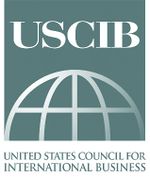United States Council for International Business: Difference between revisions
No edit summary |
No edit summary |
||
| Line 24: | Line 24: | ||
The '''United States Council for International Business''' ('''USCIB''') was established in 1945 to promote free trade and to represent businesses in the then newly formed United Nations.<ref>[http://www.uscib.org/index.asp?documentID=697 uscib.org]About USCIB</ref> Headquartered in Midtown Manhattan, USCIB also has an office in Washington, D.C. and consists of a network of sister business organizations across the world.<ref name="link2">[http://www.uscib.org/index.asp?documentID=2410 uscib.org]</ref> | The '''United States Council for International Business''' ('''USCIB''') was established in 1945 to promote free trade and to represent businesses in the then newly formed United Nations.<ref>[http://www.uscib.org/index.asp?documentID=697 uscib.org]About USCIB</ref> Headquartered in Midtown Manhattan, USCIB also has an office in Washington, D.C. and consists of a network of sister business organizations across the world.<ref name="link2">[http://www.uscib.org/index.asp?documentID=2410 uscib.org]</ref> | ||
The USCIB | The USCIB aims to provide leading American companies a recognition to succeed in the international market by helping them to work with like-minded firms to influence rules, laws and policies that will hold back the competitiveness of US businesses based anywhere in the world. It basically gives American businesses a table where they can present the American business ideas as well as the values and solutions on a large number of issues which might range from e-commerce to environment as well as to labor relations – directly to the policymakers of the United States and officials of the United Nations as well as of the European Union and other important groups and governments.<ref name="link2">[http://www.uscib.org/index.asp?documentID=2410 uscib.org]</ref> | ||
== Functions of the USCIB == | == Functions of the USCIB == | ||
Revision as of 08:24, 14 August 2011
 | |
| Founded: | 1945 |
| Headquarters: | 1212 Avenue of the Americas New York, NY 10036 |
| Country: | USA |
| Website: | uscib.org |
| Facebook: | USCIB |
| LinkedIn: | USCIB |
| Twitter: | |
| Key People | |
| Harold McGraw III, Chairman Mark W. Albers, Vice Chairman Thomas M.T. Niles, Vice Chairman William G. Parrett, Vice Chairman Inge Thulin, Vice Chairman Donald Monks, Tresurer John E. Merow, Esq., Secretary Peter M. Robinson, President | |
The United States Council for International Business (USCIB) was established in 1945 to promote free trade and to represent businesses in the then newly formed United Nations.[1] Headquartered in Midtown Manhattan, USCIB also has an office in Washington, D.C. and consists of a network of sister business organizations across the world.[2]
The USCIB aims to provide leading American companies a recognition to succeed in the international market by helping them to work with like-minded firms to influence rules, laws and policies that will hold back the competitiveness of US businesses based anywhere in the world. It basically gives American businesses a table where they can present the American business ideas as well as the values and solutions on a large number of issues which might range from e-commerce to environment as well as to labor relations – directly to the policymakers of the United States and officials of the United Nations as well as of the European Union and other important groups and governments.[2]
Functions of the USCIB[edit | edit source]
The USCIB works on various fronts and ensures that there is a smooth way for American Commerce overseas. It promotes the practical business service such as international commercial arbitration to settle the disputes in a swift manner.[2]
Mission Statement of the USCIB[edit | edit source]
USCIB works for the advancement of the global interests of American businesses both at domestic levels as well as at the international levels. The USCIB is kind of an American associate of the International Chamber of Commerce or the ICC, the International Organization of Employers (IOE) and the Business and Industry Advisory Committee (BIAC) to the Organization for Economic Co-operation and Development OECD. Officially, the USCIB represents US business position both in the intergovernmental bodies as well as at the foreign business communities and their respective governments. [3]
USCIB looks at a comprehensive range of issues related to policy making with the sole motive of enhancing an open system for free flow of trade, investment as well as finance, which will benefit the businesses and lead towards an overall human welfare as well as contribute to the economic growth and preserve the environment.[3]
USCIB also put forward its stand in the various committees and other working bodies who are made up of the experts from the businesses for its strong 300 global membership. It also puts forward its stand to the intergovernmental organizations such as the OECD, the World Trade Organization (WTO) and the ILO and several other bodies of the United Nations System with which its international associates have official consultative status on behalf of the world business. [3]
By working on the harmonization of commercial practices in the International Chamber of Commerce, the USCIB facilitates international trade. The USCIB issues as well as guarantees ATA Carnets which are nothing but documents under which the merchandise can be imported duty free on a temporary basis in the United States as well as in the other countries. The USCIB also works to promote the use of ICC, International Court of Arbitration in the United States to solve the commercial disputes.[3]
USCIB and ICANN[edit | edit source]
The USCIB was one of the founding members for the Business Constituency within ICANN's GNSO. It was also one of the active members in the formation process of ICANN. This was mainly because of the technical coordination of the Internet and the importance of the Internet to all of its business. [4] The USCIB also contributes towards the ICANN Leadership Selections by participating in the Nominating Committee (NomCom). [5]
References[edit | edit source]

